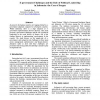Free Online Productivity Tools
i2Speak
i2Symbol
i2OCR
iTex2Img
iWeb2Print
iWeb2Shot
i2Type
iPdf2Split
iPdf2Merge
i2Bopomofo
i2Arabic
i2Style
i2Image
i2PDF
iLatex2Rtf
Sci2ools
HICSS
2008
IEEE
2008
IEEE
E-Government Challenges and the Role of Political Leadership in Indonesia: The Case of Sragen
In general, developing countries are lagging behind in egovernment adoption compared to developed countries. Within Indonesia, there is a huge disparity in egovernment implementation between districts. This study presents e-government challenges and the role of political leadership in the rural district of Sragen, one of the leading districts in implementing e-government in the country. The study focuses on the supply-side of egovernment, and categorises the challenges in three main areas; management, infrastructure, and human factors. Initiatives taken to deal with these challenges are presented and strong political leadership is found to play an important role.
Biometrics | Egovernment | Egovernment Adoption | HICSS 2008 | Political Leadership | System Sciences |
| Added | 29 May 2010 |
| Updated | 29 May 2010 |
| Type | Conference |
| Year | 2008 |
| Where | HICSS |
| Authors | Bjørn Furuholt, Fathul Wahid |
Comments (0)

